Search Results
Showing results 81 to 100 of 102
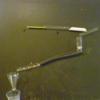
Magnetic Marble Run
Source Institutions
Learners explore magnetism and motion as they build a simple marble run. Learners test different arrangements of plastic and cardboard tubes, bottles, and cups on a magnetic board.

Catapult
Source Institutions
Build a catapult that transforms the potential energy of a twisted rubber band into kinetic energy. Experiment with design variations so that you can hit a target with a projectile.
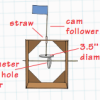
Crank It Up
Source Institutions
In this engineering activity, learners explore simple machines and then build cardboard automata using cams.

Soaring Satellites
Source Institutions
Working in small teams, learners try to build a satellite that can float for at least five seconds in the marked area of a vertical wind tube.

Balloon Car
Source Institutions
In this physics activity, challenge learners to make and race a balloon-powered car. Learners construct the body out of a paper cup, wheels out of wooden spools. and fuel tank out of a balloon.

Pencil Balance
Source Institutions
In this activity, challenge learners to make a pencil stand on its tip using only two pieces of wire and two clothespins. Use this activity to demonstrate the center of gravity.
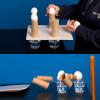
Egg Drop
Source Institutions
Perform this classic inertia demonstration to illustrate the transfer of potential energy to kinetic energy.

Hoop Glider
Source Institutions
In this activity, learners engineer a flying glider using paper hoops and a drinking straw.
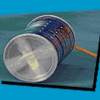
Spool Racer
Source Institutions
In this physics activity, challenge learners to make a rubber band-powered spool racer. Demonstrate principles of motion as well as potential and kinetic energy.
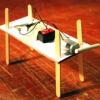
Minibot
Source Institutions
In this activity, learners build a mini dancing robot. This engineering activity introduces learners to electricity, circuits, switches, conductivity, and motors.

Snake
Source Institutions
In this physics activity (page 4 of the PDF), learners will construct their own spiral "snake" and use it to explore the relationship between heat and kinetic energy.

Can Car
Source Institutions
In this physics activity, challenge learners to make a race-car out of a coffee can and rubber band. Demonstrate motion, forces, kinetic and potential energy and friction.

Make a Comeback Can
Source Institutions
Learners build a can that automatically returns after being rolled away. The can has a rubber band inside that stores energy as the can rolls one direction.

Build a Big Wheel
Source Institutions
In this activity, learners explore how engineers have developed big wheels or Ferris wheels.

Float My Boat
Source Institutions
In this activity, learners use tinfoil to build and test their own boats - which designs will float, and which will sink?
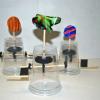
Micro Automata
Source Institutions
In this activity, learners build small animated toys that move.
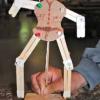
Lever Cowboy
Source Institutions
In this activity, learners build a figure that moves and "comes to life" when they pull its string.

Newton's Cradle
Source Institutions
Build your own version of the classic physics toy using simple materials.

Tinkering with Tops
Source Institutions
In this activity, learners explore the history, design and motion of spinning tops. Learners work in teams of "engineers" to design and build their own tops out of everyday items.

Hot Air Balloon
Source Institutions
In this activity, learners build a hot air balloon using just a few sheets of tissue paper and a hair dryer.
